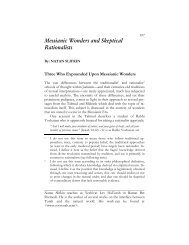Is There a Disconnect between Torah Learning and ... - Hakirah.org
Is There a Disconnect between Torah Learning and ... - Hakirah.org
Is There a Disconnect between Torah Learning and ... - Hakirah.org
Create successful ePaper yourself
Turn your PDF publications into a flip-book with our unique Google optimized e-Paper software.
<strong>Is</strong> there a <strong>Disconnect</strong> <strong>between</strong> <strong>Torah</strong> <strong>Learning</strong> <strong>and</strong> <strong>Torah</strong> Living? : 37<br />
We tell many stories of our gedolim (great <strong>and</strong> saintly leaders)<br />
practicing good middos. A cursory review of those stories will<br />
demonstrate that in most of them the greatness lay in the gadol’s<br />
sensitivity to how another person felt in a given situation. We all know<br />
the story of how Reb Yaakov Kaminetzky insisted on sitting in the<br />
front seat of a car while Reb Moshe Feinstein sat alone in the back,<br />
while a bachur drove them home from an event. Reb Yaakov did this<br />
so that when Reb Moshe, whose home would be the first stop, would<br />
get out of the car, the bachur would not be left with a passenger (Reb<br />
Yaakov) in the back seat, <strong>and</strong> feel that he is merely a chauffer. If we<br />
are to take these anecdotes seriously, we must teach our children<br />
sensitivity to the feelings of others. This can be done by way of<br />
stories, <strong>and</strong> by classroom discussions of anecdotes about people in<br />
dire straits. However, it is best done if the discussions are<br />
accompanied by actual experiences <strong>and</strong> activities in which our<br />
children meet up with people in need <strong>and</strong> are involved in helping<br />
them. Most of our schools for girls have such programs. Why not the<br />
boys’ yeshivos as well?<br />
Emotion:<br />
But even sensitivity is not enough. We must go still further. We must<br />
reach our children at the gut level. We must get them to have an<br />
intuitive sense of right <strong>and</strong> wrong. They must feel it in the gut!! A<br />
friend of mine who grew up with me in Montreal related the<br />
following personal anecdote.<br />
In Montreal where we grew up in the 50s <strong>and</strong> 60s, there was no<br />
school bus transportation provided by yeshivos. We went to school<br />
each morning using public transportation. Most of the passengers<br />
that we traveled with were, of course, not Jewish, <strong>and</strong> we were told<br />
<strong>and</strong> taught <strong>and</strong> made to feel very conscious of the fact that our<br />
behavior on the bus could create a kiddush Hashem or chas veshalom a<br />
chilul Hashem. We were taught to get up <strong>and</strong> give up our seats to any<br />
older person who was st<strong>and</strong>ing, <strong>and</strong> to otherwise be courteous to<br />
others. One winter evening, when I was about 11 years old, I was<br />
coming home from yeshiva at 6:30 pm, extremely exhausted from a<br />
long day at yeshiva, <strong>and</strong> I managed to get a seat on the bus. I<br />
decided I was too tired to give up my seat, <strong>and</strong> when an elderly lady<br />
got on the bus at the next stop, I put my head down, <strong>and</strong> closed<br />
my eyes pretending not to see her. But, then sitting there, I felt my<br />
face getting warmer <strong>and</strong> warmer <strong>and</strong> then getting hot. I was
















